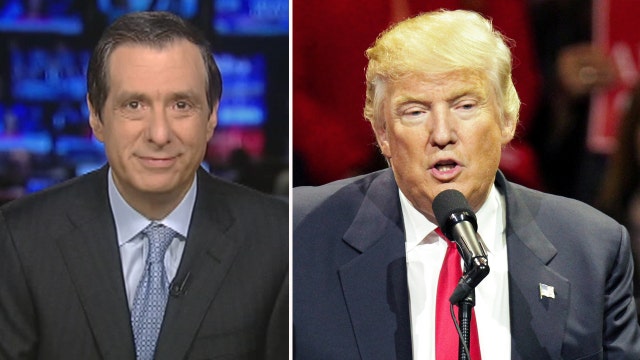Kurtz: Trump tweets taunt the press
'MediaBuzz' host Howard Kurtz weighs in on the media frenzy after every tweet president-elect Donald Trump sends
It was just like old times, Donald Trump feeding off the energy of the crowd and denouncing the “dishonest media.”
Except…the election is over. He won. Bigly.
Now I don’t begrudge the president-elect having a little fun at that Ohio rally, his first public trip outside of Trump Tower since Nov. 8. But does this mean slamming the press will become a permanent feature of his presidency?
Every commander-in-chief has the right to push back against what he views as unfair coverage, a privilege that President Obama repeatedly exercised when it came to Fox.
But does Trump want both sides on a permanently hostile footing?
Look, Trump is entitled to complain about his heavily negative campaign coverage. “We didn’t have the press. The press was brutal,” he said.
And he drew blood while recalling, in a mock-anchor voice, the pundits repeatedly saying he had no path to 270, or that “Texas is in play.” He won Texas easily and wound up with 306 electoral votes.
But for a year and a half, Trump delighted his base by hitting the press hard, all in the service of winning an election. Now he has to govern.
He had been reaching out a bit, visiting the New York Times and inviting network executives and anchors for a chat, even though those conversations included some tough criticism.
Trump has shown he has numerous ways to circumvent the media. He hasn’t held a news conference since July (after all those months of castigating Hillary Clinton for avoiding such encounters).
But should the guy who did endless interviews during the campaign use the news business to sell his policies? Or has he concluded that the press is permanently against him and there’s little point in cooperating?
One of his chief instruments for bypassing the MSM is, of course, Twitter. And that has led to one of those hand-wringing media debates, encapsulated by this New York Times headline: “If Trump Tweets, Is It Always News?”
“How to cover a president’s pronouncements when they are both provocative and maddeningly vague?” the paper asks. “Does an early-morning tweet amount to a planned shift in American policy? Should news outlets, as some readers argue, ignore clearly untrue tweets, rather than amplify falsehoods further?”
The story notes that some on social media want the media to boycott Trump’s tweets. Nation Editor Katrina vanden Heuvel said, on Twitter naturally, “Media would be wise to stop hyper-coverage of Trump’s tweets — they distract, distort and debase.”
It’s fair to question whether the press made too much of Trump’s single tweet suggesting that flag-burners be jailed or stripped of their citizenship. And I understand why news organizations went after the president-elect for tweeting, without evidence, that millions of people had voted illegally.
But everything a president puts out is news. Let’s say Twitter didn’t exist and Trump was posting 30-second videos online. Would journalists say they were too short and superficial to be covered? What if he sent out two-sentence press releases by, say, fax? Would the media blow them off as too superficial?
Ronald Reagan started the five-minute weekly radio address, and those made news for him and subsequent presidents. And as Chris Wallace pointed out to the Times, he reported it when Reagan would offer a brief response to a shouted question as he walked to the helicopter.
After Trump stirred up the media and angered China by taking a congratulatory call from Taiwan's president, he tweeted: "Interesting how the U.S. sells Taiwan billions of dollars of military equipment but I should not accept a congratulatory call." He had a point--and that is undoubtedly news.
Of course, he also tweeted that "SNL" was "unwatchable" and "totally biased," and the Alec Baldwin impersonation "just can't get any worse." That's not international news, but it shows why people keep reading him.
The media are still figuring out how to cover this most unorthodox of presidents. And he has to figure out what kind of relationship he wants with them.












































